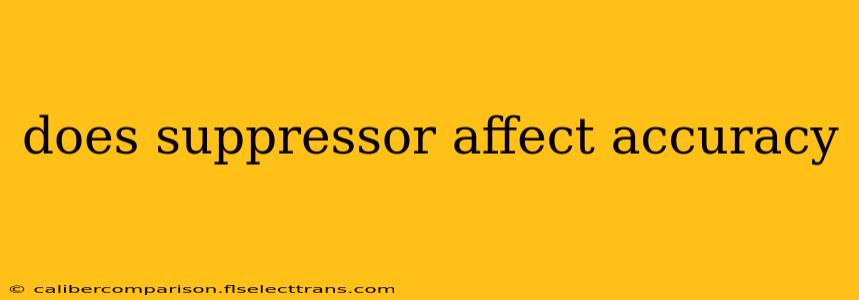The question of whether a suppressor (also known as a silencer) affects accuracy is a complex one, often debated among firearms enthusiasts and professionals alike. The short answer is: it depends. While suppressors can slightly influence accuracy, the impact is generally minor and often overshadowed by other factors affecting precision shooting.
Understanding the Potential Effects of Suppressors on Accuracy
The primary concern regarding suppressor impact on accuracy centers around the physics of projectile flight and the suppressor's design and construction. Here's a breakdown of the potential influences:
1. Added Weight and Barrel Loading
A suppressor adds weight to the end of the barrel. This extra weight can subtly shift the balance point of the firearm, potentially affecting the shooter's grip and consistency, leading to minor variations in point of impact. However, this effect is often negligible for experienced shooters who can adapt their technique. High-quality suppressors are designed to minimize this effect through careful weight distribution.
2. Back Pressure and Gas Flow
Suppressors work by slowing down the expansion of gases exiting the barrel. This can slightly alter the barrel's harmonic resonance, potentially affecting the bullet's trajectory. While this effect exists, it's typically quite small, especially with well-designed and properly installed suppressors. Furthermore, the effect is often less noticeable at longer ranges where other factors dominate.
3. Suppressor Design and Construction
The quality and design of the suppressor itself play a significant role. A poorly constructed suppressor with inconsistent internal baffles or improper alignment can negatively impact accuracy more noticeably. Conversely, a well-made suppressor from a reputable manufacturer will be engineered to minimize any accuracy-related issues.
4. Ammunition Factors
The type of ammunition used significantly impacts accuracy, often overshadowing any minimal effects a suppressor might have. Consistent ammunition with consistent velocity and bullet construction is crucial for precision shooting, regardless of whether a suppressor is used or not.
Factors that Outweigh Suppressor Impact on Accuracy
Many other variables significantly influence a firearm's accuracy, far exceeding any minor influence from a suppressor:
- Shooter skill and technique: This is arguably the most significant factor. Consistent grip, stance, breathing, and trigger control are far more impactful than a suppressor's slight influence.
- Ammunition quality and consistency: Variability in bullet weight, powder charge, and overall consistency directly affects accuracy.
- Barrel quality and condition: A worn or damaged barrel will significantly impact accuracy more than a suppressor.
- Environmental factors: Wind, temperature, and humidity all play a substantial role in projectile flight.
Conclusion: Minor Impact, Major Considerations
While a suppressor can introduce minor variations in accuracy, its impact is typically small and often overshadowed by other, more substantial factors. The choice of using a suppressor shouldn't be primarily driven by concerns about accuracy, especially with high-quality suppressors and proper shooting technique. Instead, the decision should focus on the other benefits a suppressor provides, such as noise reduction and recoil mitigation. For most shooters, the perceived loss in accuracy from using a suppressor is far outweighed by the benefits. Focusing on consistent shooting practices and high-quality ammunition will yield far more significant improvements in accuracy than any worry about suppressor impact.

